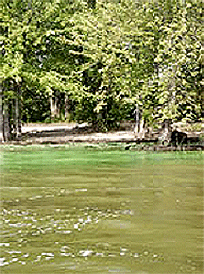Seasonal Risks to your Pet – Blue Green Algae
10th of July, 2014. Another hazard to your dog may be lurking in his favourite swimming spot. Blue green algae can thrive in stagnant ponds after a spell of warm, dry & calm weather and can prove fatal to your dog. Pets can die after ingesting only a small amount of the toxin. We have received reports of dogs that have died from contamination in the Richmond Park and Gloucestershire areas. 
BLUE GREEN ALGAE risk
Another hazard to your dog may be lurking in his favourite swimming spot. Blue green algae can thrive in stagnant ponds after a spell of warm, dry & calm weather and can prove fatal to your dog. Pets can die after ingesting only a small amount of the toxin. We have received reports of dogs that have died recently from contamination in the Richmond Park and Gloucestershire areas.
We would suggest that anyone whose dog swims or plays in ponds or lakes checks with wardens or their local authorities for up to date reports. If you do see any green slime or scum like deposits around the edge of the lake don’t let your dog in. The authorities do their best to put up warning signs, but as the algal bloom can rapidly appear do not assume that no sign means that it is safe to go in the water.
Blue green algae, also known as cyanobacteria, thrives in stagnant or slow moving water like ponds, streams and pools. It can also be found less commonly on rocks and soil. The algae produces potentially lethal toxins which are highly poisonous to pets and can cause poisoning in a number of ways, like ingesting the water when swimming, or licking the water off their fur.
Signs of toxicity are generally rapid in onset, generally occurring 1 to 8 hours after digestion. The hepapatoxin causes a rapid and severe destruction of the liver cells. The symptoms can include vomiting and diarrhoea, the dog may also appear lethargic and weak. The neurotoxins initially cause overstimulation, then depression of the nervous system. Your pet may tremble, shake, salivate (drool) and may even have seizures. As the nervous system becomes fatigued by the toxins the pet will become weaker and will suffer paralysis of the respiratory and other muscles.
Treatment for these toxins, even if caught early, is generally unsuccessful and sadly many animals each year die from blue green algae poisoning. If you do come across anywhere with this algae, ensure that your dog does not drink, swim or play in the ponds or any puddles or streams leading from the ponds.
If for any reason you suspect that your dog has come into contact with contaminated water, rinse its coat straight away with clean water and call your vet IMMEDIATELY.
